Abstract
This working paper summarizes the known ultrastructural and biochemical effects of lead, mercury, cadmium, and arsenic on subcellular organelle systems following in vivo administration. Documented metal-induced alterations in nuclear, mitochondrial, microsomal, and lysosomal functions are discussed in relation to their potential impact on cellular responses to other environmental agents. Each of the above elements has been found to interfere with normal cellular replication and genetic processes. Mitochondrial swelling and depression of respiratory function are discussed in relation to known metal-specific perturbations of mitochondrial heme biosynthetic pathway enzymes. Inhibition of microsomal enzyme activities and protein synthesis by lead and mercury is compared to the apparent absence of such effects following arsenic or cadmium exposure. Lysosomal uptake of all the metals is documented, but biochemical alterations in these structures have been reported for only mercury and cadmium. It is concluded that these toxic metals are capable of interacting with, and biochemically altering major cellular systems at dose levels below those required to produce signs of overt metal toxicity. The impact of these effects on cellular response to other metals and xenobiotics in complex exposure situations is presently unknown, and further research is urgently needed in this area.
Full text
PDF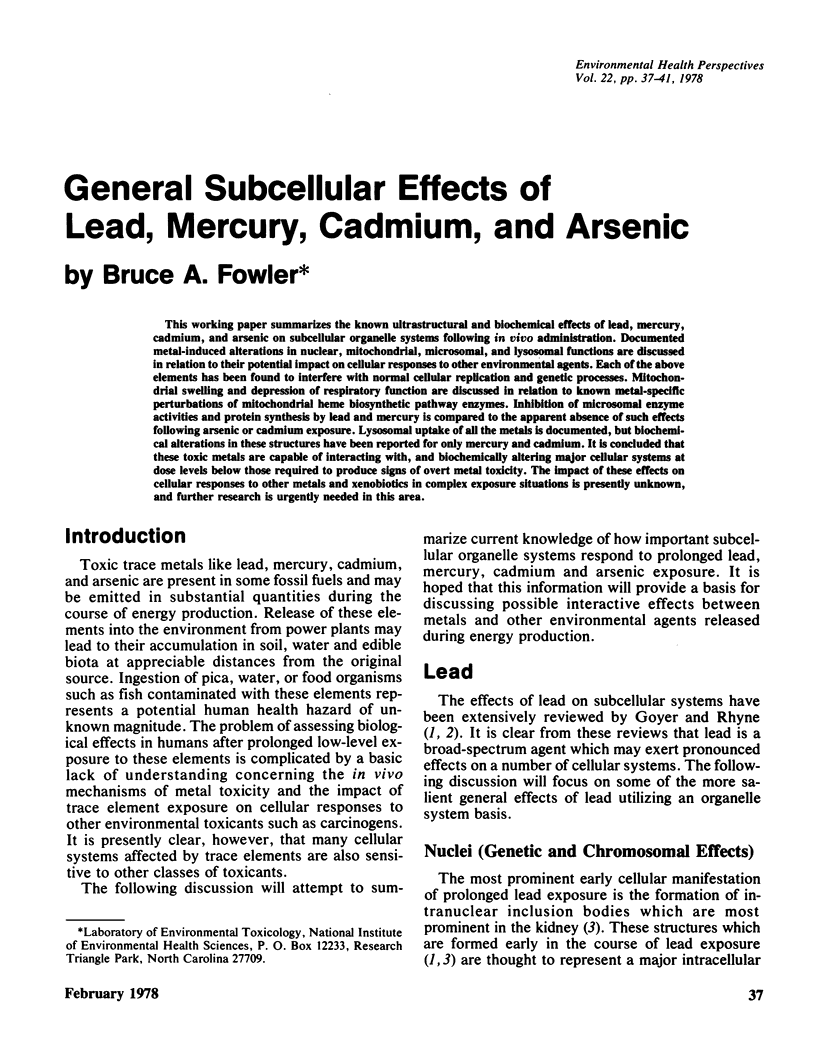
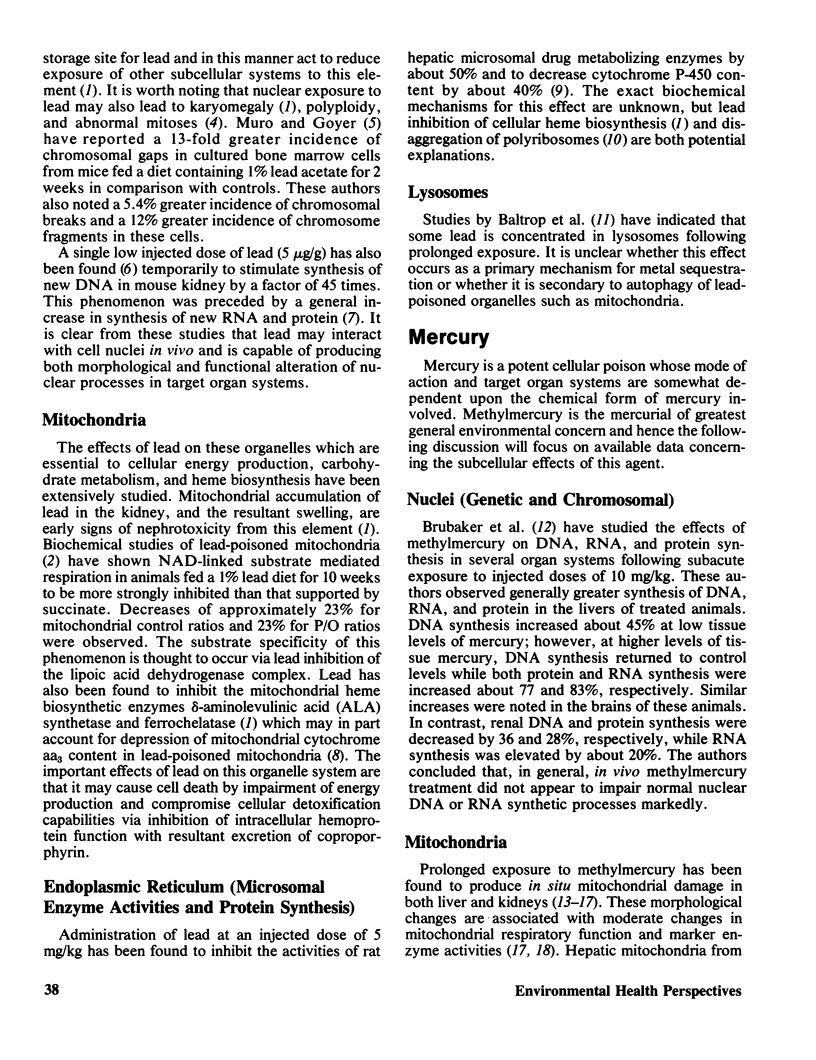
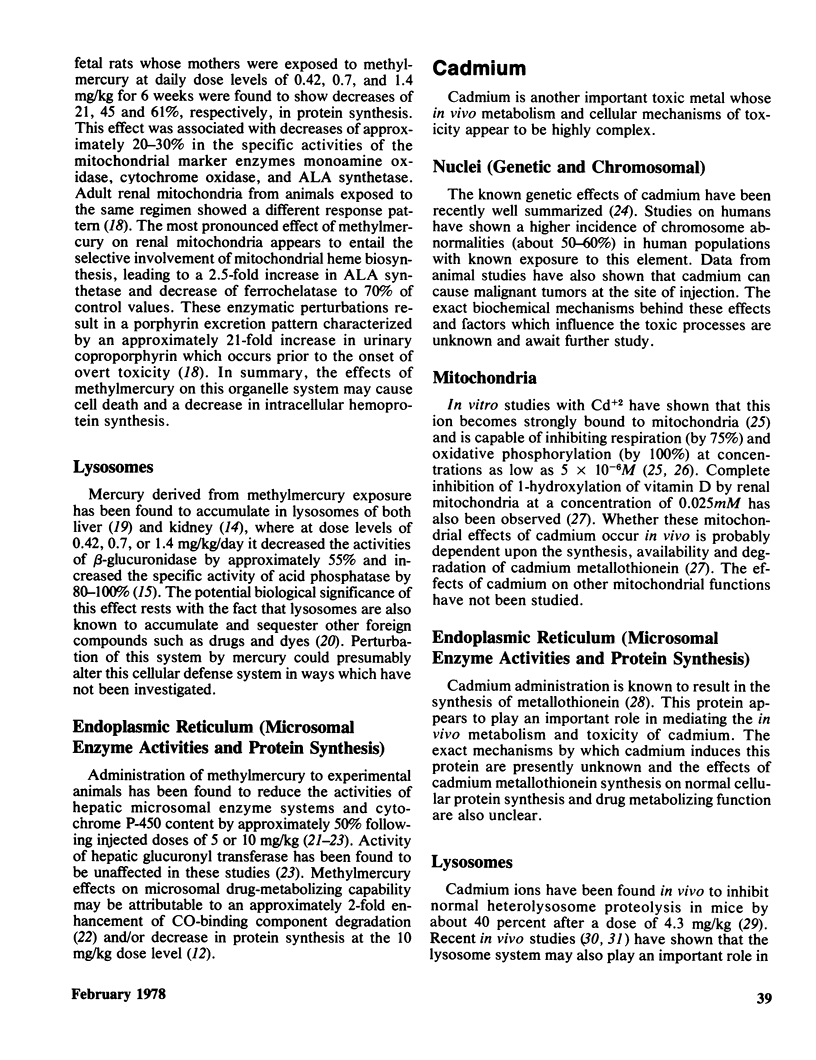
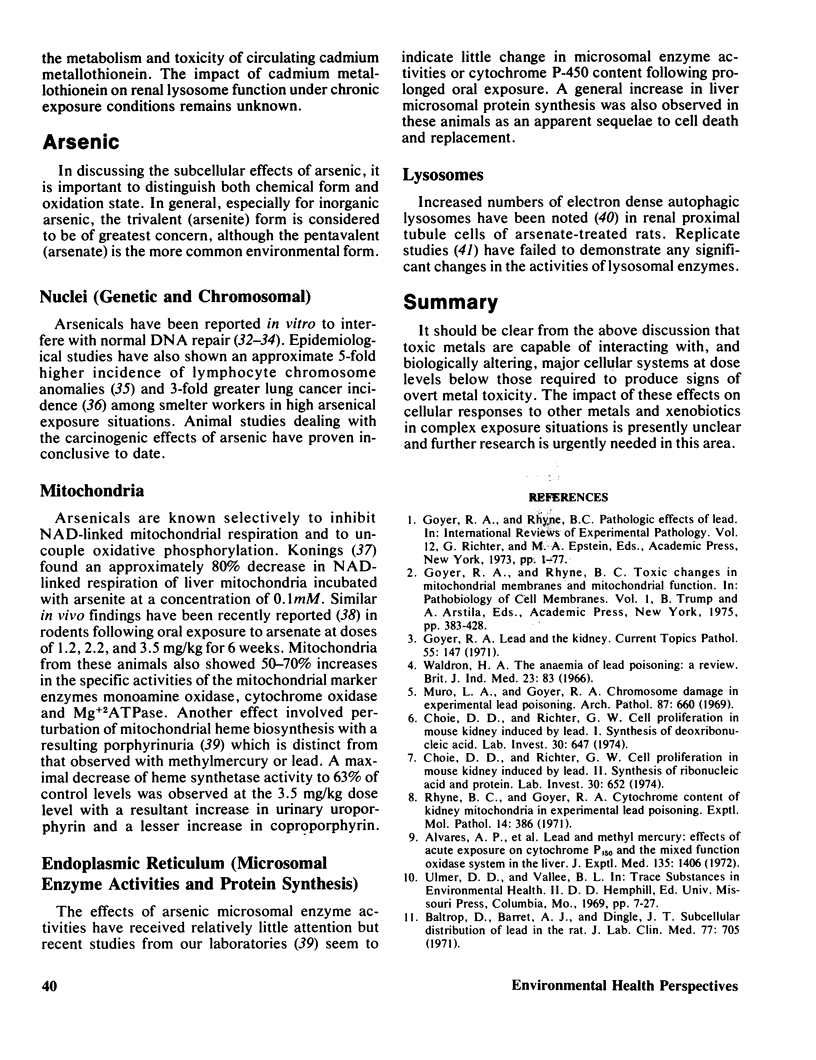
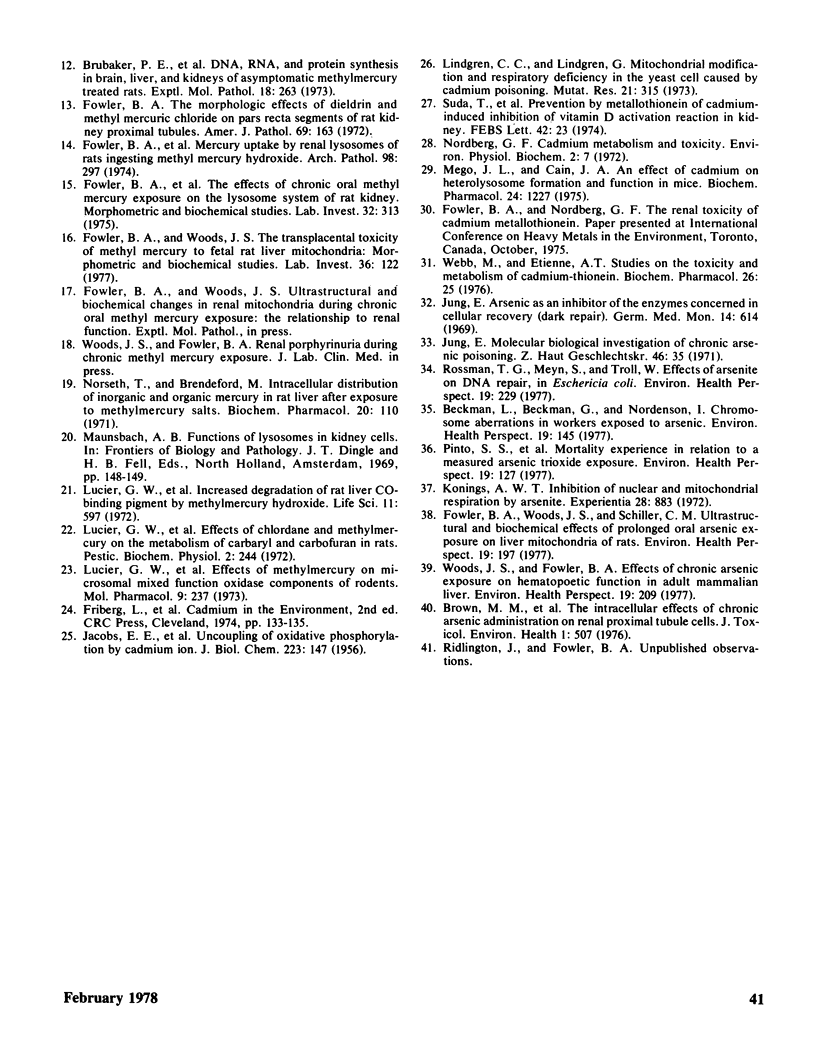
Selected References
These references are in PubMed. This may not be the complete list of references from this article.
- Alvares A. P., Leigh S., Cohn J., Kappas A. Lead and methyl mercury: effects of acute exposure on cytochrome P-450 and the mixed function oxidase system in the liver. J Exp Med. 1972 Jun 1;135(6):1406–1409. doi: 10.1084/jem.135.6.1406. [DOI] [PMC free article] [PubMed] [Google Scholar]
- BRADLEY L. B., JACOB M., JACOBS E. E., SANADI D. R. Uncoupling of oxidative phosphorylation by cadmium ion. J Biol Chem. 1956 Nov;223(1):147–156. [PubMed] [Google Scholar]
- Barltrop D., Barrett A. J., Dingle J. T. Subcellular distribution of lead in the rat. J Lab Clin Med. 1971 May;77(5):705–712. [PubMed] [Google Scholar]
- Beckman G., Beckman L., Nordenson I. Chromosome aberrations in workers exposed to arsenic. Environ Health Perspect. 1977 Aug;19:145–146. doi: 10.1289/ehp.7719145. [DOI] [PMC free article] [PubMed] [Google Scholar]
- Brubaker P. E., Klein R., Herman S. P., Lucier G. W., Alexander L. T., Long M. D. DNA, RNA, and protein synthesis in brain, liver, and kidneys of asymptomatic methylmercury treated rats. Exp Mol Pathol. 1973 Jun;18(3):263–280. doi: 10.1016/0014-4800(73)90024-5. [DOI] [PubMed] [Google Scholar]
- Choie D. D., Richter G. W. Cell proliferation in mouse kidney induced by lead. I. Synthesis of deoxyribonucleic acid. Lab Invest. 1974 May;30(5):647–651. [PubMed] [Google Scholar]
- Choie D. D., Richter G. W. Dell proliferation in mouse kidney induced by lead. II. Synthesis of ribonucleic acid and protein. Lab Invest. 1974 May;30(5):652–656. [PubMed] [Google Scholar]
- Fowler B. A., Brown H. W., Lucier G. W., Beard M. E. Mercury uptake by renal lysosomes of rats ingesting methyl mercury hydroxide. Ultrastructural observations and energy dispersive x-ray analysis. Arch Pathol. 1974 Nov;98(5):297–301. [PubMed] [Google Scholar]
- Fowler B. A., Brown H. W., Lucier G. W., Krigman M. R. The effects of chronic oral methyl mercury exposure on the lysosome system of rat kidney. Morphometric and biochemical studies. Lab Invest. 1975 Mar;32(3):313–322. [PubMed] [Google Scholar]
- Fowler B. A. The morphologic effects of dieldrin and methyl mercuric chloride on pars recta segments of rat kidney proximal tubules. Am J Pathol. 1972 Oct;69(1):163–178. [PMC free article] [PubMed] [Google Scholar]
- Fowler B. A., Woods J. S., Schiller C. M. Ultrastructural and biochemical effects of prolonged oral arsenic exposure on liver mitochondria of rats. Environ Health Perspect. 1977 Aug;19:197–204. doi: 10.1289/ehp.7719197. [DOI] [PMC free article] [PubMed] [Google Scholar]
- Fowler B. A., Woods J. S. The transplacental toxicity of methyl mercury to fetal rat liver mitochondria. Morphometric and biochemical studies. Lab Invest. 1977 Feb;36(2):122–130. [PubMed] [Google Scholar]
- Goyer R. A. Lead and the kidney. Curr Top Pathol. 1971;55:147–176. doi: 10.1007/978-3-642-65208-0_5. [DOI] [PubMed] [Google Scholar]
- Jung E. G., Traschel B., Immich H. Arsenic as an inhibitor of the enzymes concerned in cellular recovery (dark repair). Ger Med Mon. 1969 Dec;14(12):614–616. [PubMed] [Google Scholar]
- Konings A. W. Inhibition of nuclear and mitochondrial respiration by arsenite. Experientia. 1972 Aug 15;28(8):883–884. doi: 10.1007/BF01924920. [DOI] [PubMed] [Google Scholar]
- Lindegren C. C., Lindegren G. Mitochondrial modification and respiratory deficiency in the yeast cell caused by cadmium poisoning. Mutat Res. 1973 Dec;21(6):315–322. [PubMed] [Google Scholar]
- Lucier G. W., Matthews H. B., Brubaker P. E., Klein R., McDaniel O. S. Effects of methylmercury on microsomal mixed-function oxidase components of rodents. Mol Pharmacol. 1973 Mar;9(2):237–246. [PubMed] [Google Scholar]
- Mego J. L., Cain J. A. An effect of cadmium and heterolysosome formation and function in mice. Biochem Pharmacol. 1975 Jun 15;24(11-12):1227–1232. doi: 10.1016/0006-2952(75)90067-2. [DOI] [PubMed] [Google Scholar]
- Muro L. A., Goyer R. A. Chromosome damage in experimental lead poisoning. Arch Pathol. 1969 Jun;87(6):660–663. [PubMed] [Google Scholar]
- Pinto S. S., Enterline P. E., Henderson V., Varner M. O. Mortality experience in relation to a measured arsenic trioxide exposure. Environ Health Perspect. 1977 Aug;19:127–130. doi: 10.1289/ehp.7719127. [DOI] [PMC free article] [PubMed] [Google Scholar]
- Rhyne B. C., Goyer R. A. Cytochrome content of kidney mitochondria in experimental lead poisoning. Exp Mol Pathol. 1971 Jun;14(3):386–391. doi: 10.1016/0014-4800(71)90009-8. [DOI] [PubMed] [Google Scholar]
- Rossman T. G., Meyn M. S., Troll W. Effects of arsenite on DNA repair in Escherichia coli. Environ Health Perspect. 1977 Aug;19:229–233. doi: 10.1289/ehp.7719229. [DOI] [PMC free article] [PubMed] [Google Scholar]
- Waldron H. A. The anaemia of lead poisoning: a review. Br J Ind Med. 1966 Apr;23(2):83–100. doi: 10.1136/oem.23.2.83. [DOI] [PMC free article] [PubMed] [Google Scholar]
- Woods J. S., Fowler B. A. Effects of chronic arsenic exposure on hematopoietic function in adult mammalian liver. Environ Health Perspect. 1977 Aug;19:209–213. doi: 10.1289/ehp.7719209. [DOI] [PMC free article] [PubMed] [Google Scholar]


